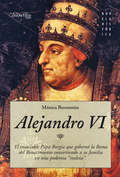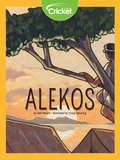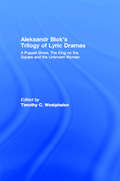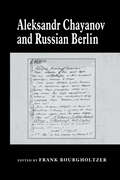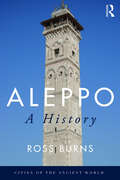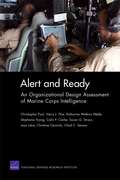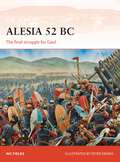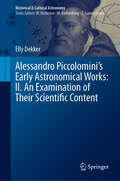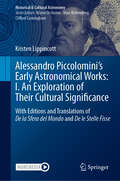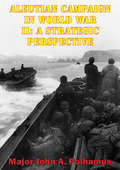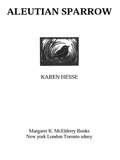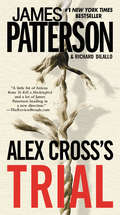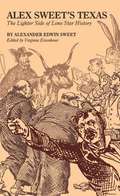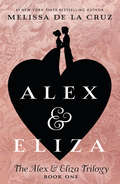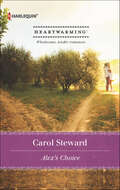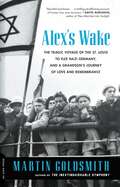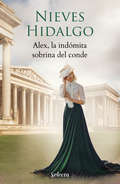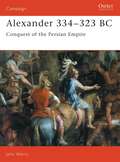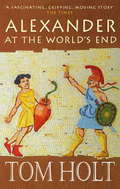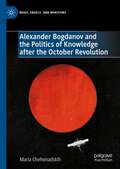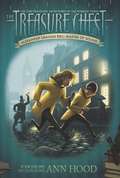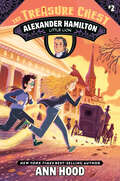- Table View
- List View
Alejandro VI (Historia Incógnita)
by Mónica BerensteinUna narración fluida, entretenida y rápida de leer, un estilo pulcro que mantiene la tensión narrativa y nos permite adentrarnos en la vida de Rodrigo Borgia.
Alekos
by Nell WrightAlekos wants to be a mighty Greek soldier like Achilles! Despite being too small to fight, he stows away on a military ship. When an opportunity to ask his hero how to learn bravery and be a fierce warrior arises, will he be brave enough to take it?
Aleksandr Blok's Trilogy of Lyric Dramas: A Puppet Show, The King on the Square and the Unknown Woman (Routledge Harwood Russian Theatre Archive Ser.)
by Timothy C. WestphalenAleksandr Blok's Trilogy of Lyric Dramas gathers together for the first time in English translation the first three plays by Aleksandr Blok, the pre-eminent poet of Russian Symbolism and one of the greatest poets of the twentieth century. The three plays that constitute the trilogy - A Puppet Show, The King on the Square and The Unknown Woman - are pivotal documents in the development of modernist drama. In his productions of A Puppet Show; and The Unknown Woman, Meyerhold first began to work the basic tenets of his approach to grotesque and constructivist theatre. Moreover, A Puppet Show provided the inspiration and much of the foundation for Meyerhold's theoretical writings. As a result, these plays are indispensable to any student of Meyerhold or modernist theatre. The plays are presented in the context of the poetry from which they issued in order to suggest how Blok developed the themes and motifs of the plays in other genres.
Aleksandr Chayanov and Russian Berlin
by Frank BourgholtzerAleksandr Chayanov lived and worked in England and Germany in the 1920s, when he wrote many letters. He was also forced to write autobiographical material after his arrest in 1930. Frank Bourgholtzer uses this material in his account of this Russian utopian.
Aleppo: A History (Cities of the Ancient World)
by Ross BurnsAleppo is one of the longest-surviving cities of the ancient and Islamic Middle East. Until recently it enjoyed a thriving urban life—in particular an active traditional suq, whose origins can be traced across many centuries. Its tangle of streets still follow the Hellenistic grid and above it looms the great Citadel, which contains recently-uncovered remains of a Bronze/Iron Age temple complex, suggesting an even earlier role as a ‘high place’ in the Canaanite tradition. In the Arab Middle Ages, Aleppo was a strongpoint of the Islamic resistance to the Crusader presence. Its medieval Citadel is one of the most dramatic examples of a fortified enclosure in the Islamic tradition. In Mamluk and Ottoman times, the city took on a thriving commercial role and provided a base for the first European commercial factories and consulates in the Levant. Its commercial life funded a remarkable building tradition with some hundreds of the 600 or so officially-declared monuments dating from these eras, and its diverse ethnic mixture, with significant Kurdish, Turkish, Christian and Armenian communities provide a richer layering of influences on the city’s life. In this volume, Ross Burns explores the rich history of this important city, from its earliest history through to the modern era, providing a thorough treatment of this fascinating city history, accessible both to scholarly readers as well as to the general public interested in a factual and comprehensive survey of the city’s past.
Alert and Ready: An Organizational Design Assessment of Marine Corps Intelligence
by Christopher Paul Colin P. Clarke Harry J. Thie Stephanie Young Katharine Watkins WebbOver the past decade, especially, U.S. Marine Corps (USMC) intelligence has had to tailor its organization to meet the evolving demands of the operational environment. This has resulted in a number of ad hoc arrangements, practices, and organizations. A broad review of the organizational design of USMC intelligence examined how to align it efficiently and effectively with current and future missions and functions.
Alesia 52 BC
by Peter Dennis Nic FieldsCaesar's Legions laid siege to Vercingetorix's Gallic army in one of the most tactically amazing battles of all time. Outnumbered 6:1, the Romans built siege lines facing inward and outward and prevented the Gauls from breaking the siege. The campaign leading to the battle revealed ingenuity on both sides, though in the end Caesar established his fame in these actions.In 52 BC, Caesar's continued strategy of annihilation had engendered a spirit of desperation, which detonated into a revolt of Gallic tribes under the leadership of the charismatic, young, Arvernian noble, Vercingetorix. Though the Gallic people shared a common language and culture, forging a coalition amongst the fiercely independent tribes was a virtually impossible feat, and it was a tribute to Vercingetorix's personality and skill.Initially Vercingetorix's strategy was to draw the Romans into pitched battle. Vercingetorix was soundly beaten in the open field battle against Caesar at Noviodunum, followed by the Roman sack of Avaricum. However, the action that followed at Gergovia amounted to the most serious reverse that Caesar faced in the whole of the Gallic War. Vercingetorix began a canny policy of small war and defensive maneuvers, which gravely hampered Caesar's movements by cutting off his supplies. For Caesar it was to be a grim summertime - his whole Gallic enterprise faced liquidation.In the event, by brilliant leadership, force of arms, and occasionally sheer luck, Caesar succeeded. This culminated in the siege of Alesia (north of Dijon), which Caesar himself brilliantly narrates (Bellum Gallicum 7.68-89). With his 80,000 warriors and 1,500 horsemen entrenched atop a mesa at Alesia, the star-crossed Vercingetorix believed Alesia was unassailable. Commanding less than 50,000 legionaries and assorted auxiliaries, Caesar nevertheless began the siege. Vercingetorix then dispatched his cavalry to rally reinforcements from across Gaul, and in turn Caesar constructed a contravallation and circumvallation, a double wall of fortifications around Alesia facing toward and away from the oppidum. When the Gallic relief army arrived, the Romans faced the warriors in Alesia plus an alleged 250,000 warriors and 8,000 horsemen attacking from without. Caesar adroitly employed his interior lines, his fortifications, and the greater training and discipline of his men to offset the Gallic advantage, but after two days of heavy fighting, his army was pressed to the breaking point. On the third day, the Gauls, equipped with fascines, scaling ladders and grappling hooks, captured the northwestern angle of the circumvallation, which formed a crucial point in the Roman siege works. In desperation, Caesar personally led the last of his reserves in a do-or-die counterattack, and when his Germanic horsemen outflanked the Gauls and took them in the rear, the battle decisively turned. The mighty relief army was repulsed.Vercingetorix finally admitted defeat, and the entire force surrendered the next day. Alesia was to be the last significant resistance to Roman will in Gaul. It involved virtually every Gallic tribe in a disastrous defeat, and there were enough captives for each legionary to be awarded one to sell as a slave. In a very real sense Alesia symbolized the extinction of Gallic liberty. Rebellions would come and go, but never again would a Gallic warlord independent of Rome hold sway over the Celts of Gaul.
Alessandro Piccolomini’s Early Astronomical Works: II. An Examination of Their Scientific Content (Historical & Cultural Astronomy)
by Elly DekkerThis book presents the first detailed scientific examination of Alessandro Piccolomini’s two early astronomical works – De la Sfera del Mondo and De le Stelle Fisse. First published in Venice in 1540, the two treatises are amongst the earliest scientific texts written in the vernacular (Italian) and were specifically composed to make astronomical principles and practices available to a lay reader. Whereas De la Sfera del Mondo is essentially an updated adaptation of the theoretical astronomical material contained in Sacrobosco’s De Sphaera, this book examines his views on a number of key topics – such as precession, the motion of the solar apogee and the size and distance of the planets from Earth. The author also presents a radical reassessment of De le Stelle Fisse, focusing on the innovative methods Piccolomini employed to create a viewer-centric approach for identifying the stars. As such, Piccolomini’s guide to the heavens should be seen as a distant forerunner of the successful genre of elementary handbooks that were developed in the late 18th century, and which remain popular with amateur stargazers even in the 21st century. The book also addresses how Piccolomini’s treatises were used by contemporary astronomers by examining the manuscript notes that were left in various surviving copies of his books. It provides a convincing explanation of the unique directional notation on his stellar maps and assesses the relative accuracy of his stellar co-ordinates against contemporary and modern ephemerides and pictorial sources. It also argues that Piccolomini probably designed his distinctive series of maps of the constellations and the related Tables by using a celestial globe to compile his astronomical data. Finally, the author examines the series of refinements and corrections in the successive editions of Piccolomini’s two treatises, thereby showing the extent to which his two early astronomical treatises remained an on-going enterprise for over 60 years. This book is a companion volume to Alessandro Piccolomini’s Early Astronomical Works: I. An Exploration of Their Cultural Significance by Kristen Lippincott in the same series.
Alessandro Piccolomini’s Early Astronomical Works: With Editions and Translations of De la Sfera del Mondo and De le Stelle Fisse (Historical & Cultural Astronomy)
by Kristen LippincottThis book presents the first interdisciplinary study of Alessandro Piccolomini’s two early astronomical works – De la Sfera del Mondo and De le Stelle Fisse. First published in Venice in 1540, the two treatises are amongst the earliest scientific texts written in the vernacular (Italian) and were specifically composed to make astronomical principles and practices available to a lay reader. The book includes modern editions of the original Italian texts and an English translation of both treatises (all appended as Electronic Supplementary Material to the online edition), while also examining the contents of each treatise in depth. It explores the way in which Piccolomini addresses the theoretical underpinnings of the science of astronomy in his De la Sfera del Mondo by providing a version of Sacrobosco’s De sphaera, which he has expanded and updated to include the views of more recent natural philosophers and astronomers. The book also presents an extended study ofDe le Stelle Fisse and the unique method that Piccolomini devised for observing the stars, as well as explanatory notes on the sources behind his explanations of the mythographic sources of each constellation.In addition to this, the book presents a detailed examination of the cultural context in which Piccolomini wrote his treatises, focussing on such issues as how astronomy was taught in Italian universities in the 16th-century; the on-going debates on the viability of Italian as language as a means for discussing scientific ideas; and how Piccolomini navigated through the competitive and complicated world of book production in 16th-century Venice. Given that Piccolomini originally dedicated both treatises to his female friend, the Sienese aristocrat Laudomia Forteguerri, there is also a discussion of the mysteries behind their personal relationship; of the dynamics of Sienese society at the time; and, in particular, the role that the Sienese Accademia degli Intronati played in Piccolomini’s own intellectual development and the composition of his astronomical treatises.This book is a companion volume to Alessandro Piccolomini’s Early Astronomical Works: II. An Examination of Their Scientific Content by Elly Dekker in the same series.
Aleutian Campaign In World War II: A Strategic Perspective
by Major John A. PolhamusThis work is a detailed historical study of the Second World War's little known Aleutian Campaign in the North Pacific, commonly referred to as the "Forgotten War." After describing the events that transpired in the North Pacific throughout the war, this work focuses on the strategic reasons why the United States and Japan decided to dedicate critical and limited resources to a secondary effort in the North Pacific. The strategies are compared to determine which country dedicated a higher percentage of available manpower and resources to the region and which country gained an advantage from their respective propaganda efforts. Despite the United States' tactical and operational victories in the North Pacific, the Japanese benefited at the strategic level. Secondary theaters of operations, like the Aleutians during World War II, produced many lessons that were applied to other theaters during the war and remain relevant today in the Global War on Terrorism.
Aleutian Sparrow
by Karen Hesse Evon Zerbetz"Your work, Vera," Alfred's grandfather told me, "your work is to know the ways of our people." In June of 1942, seven months after attacking Pearl Harbor, the Japanese navy invaded Alaska's Aleutian Islands. For nine thousand years the Aleut people had lived and thrived on these treeless, windswept lands. Within days of the first attack, the entire native population living west of Unimak Island was gathered up and evacuated to relocation centers in the dense forests of Alaska's Southeast. With resilience, compassion, and humor the Aleuts responded to the sorrows of upheaval and dislocation. This is Vera's story, but it is woven from the same fabric as the stories of displaced peoples throughout history. It chronicles the struggle to survive and to keep community and heritage intact despite harsh conditions in an alien environment. In a luminous novel of unrhymed verse, Newbery winner Karen Hesse brings to light this little-known episode from America's past.
Alex Cross's Trial (Alex Cross #15)
by James Patterson Richard DilalloFrom his grandmother, Alex Cross has heard the story of his great uncle Abraham and his struggles for survival in the era of the Ku Klux Klan. Now, Alex passes the family tale along to his own children in a novel he's written--a novel called Trial. As a lawyer in turn-of-the-century Washington D.C., Ben Corbett represents the toughest cases. Fighting against oppression and racism, he risks his family and his life in the process. When President Roosevelt asks Ben to return to his home town to investigate rumors of the resurgence of the Ku Klux Klan there, he cannot refuse. When he arrives in Eudora, Mississippi, Ben meets the wise Abraham Cross and his beautiful daughter, Moody. Ben enlists their help, and the two Crosses introduce him to the hidden side of the idyllic Southern town. Lynchings have become commonplace and residents of the town's black quarter live in constant fear. Ben aims to break the reign of terror--but the truth of who is really behind it could break his heart. Written in the fearless voice of Detective Alex Cross, Alex Cross's Trial is a gripping story of murder, love, and, above all, bravery.
Alex Sweet's Texas: The Lighter Side of Lone Star History
by Sweet Alexander EdwinAlexander Edwin Sweet (1841-1901) is Texas's own "Sifter," whose humorous columns appeared in the Galveston Daily News in the late 1870s and early 1880s. In his wickedly funny, tongue-in-cheek sketches, readers learned of an astonishing variety of frontier phenomena, some familiar, others downright odd. For example, there was the typical nineteenth-century custom of New Year's Day receptions for bachelor guests only, with refreshments consisting largely of strong drink and equally strong fruitcake. Imbibing a bit more cheer at each stop, according to Sweet, the bachelors brought the last prospective sweethearts they visited New Year's greetings as incoherent as they were heartfelt. At times Sweet parodied the Yankee image of the typical Texan, whom he described as "half alligator, half human," eating raw buffalo and toting an arsenal of weaponry like a "perambulating gun-rack." But he also did as much as any writer to establish and enlarge upon the national image of Texas and Texans. Even the irascible red ant and the other "critters" in Sweet's column were Texas big and Texas-fabulous! In 1881 Sweet co-founded Texas Siftings, a humor magazine that moved from Austin to New York to become one of the most popular periodicals of its kind in the United States. From Texas Siftings, from Sweet's two published books (one called by John Jenkins in Basic Texas Books the "best volume of 19th century Texas humor"), and from many never-before-collected newspaper columns, editor Virginia Eisenhour has assembled an Alex Sweet sampler that presents the very best of the timeless humorist's work. The result—Alex Sweet's Texas—clearly demonstrates why the New York Journal pronounced Sweet "second to no living writer in freshness, originality, sparkling wit, and refined humor." A century later, that wit still sparkles and is guaranteed to delight Texans present as it once did Texans past.
Alex and Eliza: A Love Story (The Alex & Eliza Trilogy #1)
by Melissa de la Cruz<P> 1777. Albany, New York. <P>As battle cries of the American Revolution echo in the distance, servants flutter about preparing for one of New York society’s biggest events: the Schuylers’ grand ball. Descended from two of the oldest and most distinguished bloodlines in New York, the Schuylers are proud to be one of their fledgling country’s founding families, and even prouder still of their three daughters—Angelica, with her razor-sharp wit; Peggy, with her dazzling looks; and Eliza, whose beauty and charm rival those of both her sisters, though she’d rather be aiding the colonists’ cause than dressing up for some silly ball. <P>Still, Eliza can barely contain her excitement when she hears of the arrival of one Alexander Hamilton, a mysterious, rakish young colonel and General George Washington’s right-hand man. Though Alex has arrived as the bearer of bad news for the Schuylers, he can’t believe his luck—as an orphan, and a bastard one at that—to be in such esteemed company. And when Alex and Eliza meet that fateful night, so begins an epic love story that would forever change the course of American history. In the pages of Alex and Eliza, author Melissa de la Cruz brings to life the romance of young Alexander Hamilton and Elizabeth Schuyler. <P><b>A New York Times Bestseller</b>
Alex's Choice
by Carol StewardAn unexpected fireKatarina Berthoff had everything planned out. Her business was developing well, and her stable boyfriend would propose in eight weeks, according to his timetable. Then smoke jumper Alex MacIntyre-Katarina's teenage crush-reentered her life. Alex was kind and romantic and just as handsome as she remembered. And he was definitely not part of the plan.Things weren't exactly going as Alex expected, either. He'd left smoke jumping only temporarily to help his brother Kevin run his construction business. Eventually he would be going back to his dangerous calling as a firefighter. There was no place in that life for a vivacious and beautiful woman who also happened to be practically engaged. But Alex couldn't deny that he liked the regular hours in construction, being there for family get-togethers...and coming home to Katarina. Which meant he had a choice to make-and so did she.
Alex's Wake: The Tragic Voyage of the St. Louis to Flee Nazi Germany-and a Grandson’s Journey of Love and Remembrance
by Martin GoldsmithAlex's Wake is a tale of two parallel journeys undertaken seven decades apart. In the spring of 1939, Alex and Helmut Goldschmidt were two of more than 900 Jewish refugees fleeing Nazi Germany aboard the St. Louis, "the saddest ship afloat" (New York Times). Turned away from Cuba, the United States, and Canada, the St. Louis returned to Europe, a stark symbol of the world's indifference to the gathering Holocaust. The Goldschmidts disembarked in France, where they spent the next three years in six different camps before being shipped to their deaths in Auschwitz.In the spring of 2011, Alex's grandson, Martin Goldsmith, followed in his relatives' footsteps on a six-week journey of remembrance and hope, an irrational quest to reverse their fate and bring himself peace. Alex's Wake movingly recounts the detailed histories of the two journeys, the witnesses Martin encounters for whom the events of the past are a vivid part of a living present, and an intimate, honest attempt to overcome a tormented family legacy.
Alex, la indómita sobrina del conde
by Nieves HidalgoVuelve Nieves Hidalgo con una novela llena de romance, acción y aventura.Si te gustó la trilogía «Un romance en Londres» no te pierdas la historia de Alex. A veces el amor está reñido con el orgullo. Alexandra Tanner ha compartido desde pequeña el amor de sus padres por la egiptología. Sin embargo, no olvida la ciudad en la que nació, Londres, a la que regresaría con renovado entusiasmo tras cada expedición... si en ella no viviese Daniel Bridge; un hombre del que está enamorada desde que era adolescente, pero que la ha rechazado dos veces. Decide no volver a humillarse, no demostrarle nunca más que lo ama, hacer como que no existe. Pero el inesperado robo de una obra de arte en el Museo Británico les obliga a colaborar, a seguir las pocas pistas que tienen y a arriesgar incluso la vida. Daniel, a pesar de querer alejarse de Alex porque no se siente digno de ella, acabará por darse cuenta de que no puede luchar contra lo que siente por esa díscola, intrigante y perturbadora muchacha que le quita el sueño. Sobre la trilogía «Un romance en Londres» se ha dicho...«Me encantan las novelas románticas de corte histórico, son mis favoritas, pero si además están ambientadas en la Regencia inglesa, puedo decir sin equivocarme que no me van a defraudar. Este es el caso de Rivales de día, amantes de noche de Nieves Hidalgo. [...] Personalmente no puedo pedir más, porque disfrutar de la trama ha hecho que descubra unos protagonistas con mucha química y que me entren ganas de descubrir el siguiente volumen de la saga.»Blog Promesas de amor «En un ambiente y un siglo para nada feminista, Nieves crea un personaje que a mí me parece un muy buen reflejo del feminismo; alguien que lucha por sus ideales propios defendiendo lo que cree sin dejar que su condición de mujer la limite. Y sin dejarse tampoco atosigar ni dominar por el hombre del que termina enamorándose.»Blog justonemorescaredwriter.blogspot.com
Alexander 334-323 BC
by John WarryAlexander of Macedonia was undoubtedly one of the greatest generals of all time. This book, by John Warry, an expert on the warfare of the Classical world, examines the principle battles of Alexander's campaigns in detail. The battles of the Granicus, Issus, Gaugamela, Hydaspes and the difficult siege of Tyre are all discussed at length. These careful studies shed light on Macedonian tactics: in particular the combination of armoured infantry phalanx with fast-moving cavalry. The men and equipment of both Alexander and his Persian enemies are also examined, providing a comprehensive insight into Alexander's life and military actions.
Alexander At The World's End
by Tom Holt'Wry and droll, fascinating and funny, by bringing us Alexander's nether parts this novel gives momentous matters unforgettable life' - Ross Leckie'Witty, ironic ... and achieves a deeply felt authenticity' - NEW YORK TIMESWhen his father dies, and he is reduced at a stroke from prosperity to penury, Euxenus decides to leave Athens and seek his fortune elsewhere. As a philosopher and intellectual of some note, he has no difficulty getting a job as tutor to a young prince in the wealthy but utterly provincial court of King Philip of Macedon. The young prince is called Alexander, and the rest is history. Or is it? Alexander conquered Greece, Egypt and the Persian Empire in the course of eight years, amassing a huge army along the way, and leaving behind him the foundations of countless new cities named after him. He proclaimed himself a deity, and died at the age of 33. In ALEXANDER AT THE WORLD'S END, Tom Holt tells the story of two remarkable men, one of whom conquered empires and one of whom struggled to overcome the drainage problems of a small village. It is a story of two men whose paths crossed only briefly, but whose encounter changed both their lives for ever. And it is a story which throws an extraordinary new light on the man who became Alexander the Great.Books by Tom Holt:Walled Orchard SeriesGoatsongThe Walled OrchardJ.W. Wells & Co. SeriesThe Portable DoorIn Your DreamsEarth, Air, Fire and CustardYou Don't Have to Be Evil to Work Here, But It HelpsThe Better MousetrapMay Contain Traces of MagicLife, Liberty and the Pursuit of SausagesYouSpace SeriesDoughnutWhen It's A JarThe Outsorcerer's ApprenticeThe Good, the Bad and the SmugNovelsExpecting Someone TallerWho's Afraid of BeowulfFlying DutchYe Gods!OvertimeHere Comes the SunGrailblazersFaust Among EqualsOdds and GodsDjinn RummyMy HeroPaint your DragonOpen SesameWish you Were HereAlexander at World's EndOnly HumanSnow White and the Seven SamuraiOlympiadValhallaNothing But Blue SkiesFalling SidewaysLittle PeopleSong for NeroMeadowlandBarkingBlonde BombshellThe Management Style of the Supreme BeingsAn Orc on the Wild Side
Alexander Bogdanov and the Politics of Knowledge after the October Revolution (Marx, Engels, and Marxisms)
by Maria ChehonadskihIn this book, Maria Chehonadskih unsettles established narratives about the formation of a revolutionary canon after the October Revolution. Displacing the centre of gravity from dialectical materialism to the rapid dissemination, canonisation and decline of a striking convergence of empiricism and Marxism, she explores how this tendency, overshadowed by official historiography, establishes a new attitude to modernity and progress, nature and environment, agency and subjectivity, party and class, knowledge and power. The book traces the adventure of the synthesis of empiricism and Marxism across philosophy, science, politics, art and literature from the 1890s to the 1930s, offering a radical rethinking of the true scope and scale that the main proponent of Empirio-Marxism, Alexander Bogdanov, had on the post-revolutionary socialist legacies. Chehonadskih draws on both key and forgotten figures and movements, such as Proletkult, Productivism and Constructivism, filling a gap in the literature that will be particularly significant for Marxism, continental philosophy, art theory and Slavic studies specialists.
Alexander Girard, Architect: Creating Midcentury Modern Masterpieces (Painted Turtle)
by Deborah Lubera Kawsky Ruth Adler SchneeDuring the midcentury period, Michigan attracted visionary architects, designers, and theorists, including Alexander Girard. While much has been written about Girard’s vibrantly colored and patterned textiles for Herman Miller, the story of his Detroit period (1937–53)—encompassing interior and industrial design, exhibition curation, and residential architecture—has not been told. Alexander Girard, Architect: Creating Midcentury Modern Masterpieces by Deborah Lubera Kawsky is the first comprehensive study of Girard’s exceptional architectural projects, specifically those concentrated in the ultra-traditional Detroit suburb of Grosse Pointe. One exciting element of the book is the rediscovery of another Girard masterpiece—the only surviving house designed entirely by Girard, and former residence to Mr. and Mrs. John McLucas. Restored in consultation with iconic midcentury designer Ruth Adler Schnee, the McLucas house represents the culmination of Girard’s Detroit design work at midcentury. Stunning color photographs capture the unique design elements—including the boldly colored glazed brick walls of the atrium—reminiscent of Girard’s role as color consultant for the GM Tech Center. Original Girard drawings for the building plan, interior spaces, and custom-designed furniture document the mind of a modernist master at work and are made available to the public for the first time in this beautiful book. Alexander Girard, Architect is a beautiful, informative book suited for enthusiasts of Alexander Girard, the midcentury modern aesthetic, and Detroit history, art, and architecture.
Alexander Graham Bell #7
by Ann Hood Denis ZilberIn Book 7 of The Treasure Chest, Maisie and Felix meet a young Alexander Graham Bell (the inventor of the telephone) in Edinborough, Scotland, just as he leaves for a year with his grandfather, an elocutionist, in London. When the twins get separated from Alexander, they join the thousands of orphans in the streets of Victorian London. Maisie becomes an orange seller and Felix a chimney sweep as they search the foggy streets for Alexander...and each other. Back at home, they cope with the upcoming wedding of Great Uncle Thorne, who makes them leave Elm Medona and return to the upstairs servants quarters. Includes great non-fiction content with biographies of Alexander Graham Bell and Charles Dickens and Ann Hood's Favorite Facts from her research!
Alexander Graham Bell Answers the Call
by Mary Ann FraserWell before Alexander Graham Bell invented the telephone, Aleck (as his family called him) was a curious boy, interested in how and why he was able to hear the world all around him. His father was a speech therapist who invented the Visible Alphabet and his mother was hearing impaired, which only made Aleck even more fascinated by sound vibration and modes of communication. Naturally inquisitive and inclined to test his knowledge, young Aleck was the perfect person to grow up in the Age of Invention. As a kid he toyed with sound vibrations and began a life of inventing. This in-depth look at the life and inspiration of the brilliant man who invented the tele-phone is sure to fire up the imaginations of young readers who question why and how things work. Driven by curiosity and an eagerness to help others, Aleck became a teacher for the deaf. His eventual invention of the telephone proved that he never stopped thinking big or experimenting with sound.Backmatter includes more information about Bell&’s inventions, a timeline of his life, a bibliography, and sources for further learning.
Alexander Graham Bell for Kids: His Life and Inventions, with 21 Activities (For Kids series #70)
by Mary Kay CarsonWinner of the 2019 AAAS/Subaru SB&F Prize for Excellence in Science Book Alexander Graham Bell invented not only the telephone, but also early versions of the phonograph, the metal detector, airplanes, and hydrofoil boats. This Scottish immigrant was also a pioneering speech teacher and a champion of educating those with hearing impairments, work he felt was his most important contribution to society. Bell worked with famous Americans such as Helen Keller and aviators Glenn Curtiss and Samuel P. Langley, and his inventions competed directly with those of Thomas Edison and the Wright Brothers. This unique biography includes a time line, a list of online resources, and 21 engaging hands-on activities to better appreciate Bell's remarkable accomplishments. Kids will: Construct a Pie Tin Telegraph and a Pizza Box Phonograph "See" and "feel" sound by building simple devices Communicate using American Sign Language Send secret messages using Morse code Investigate the properties of ailerons on a paper airplane Build and fly a tetrahedral kite And more!
Alexander Hamilton #2: Little Lion (The Treasure Chest #2)
by Ann HoodNow that the twins have begun to settle into their new lives at Elm Medona, they delve deeper into The Treasure Chest and uncover more about the Pickworth family, including the disappearance of their great-uncle Thorne and the theft of priceless family artifacts.In this adventure, The Treasure Chest transports Felix and Maisie to tropical St. Croix in 1772. There they meet a young man named Alexander Hamilton who is about to embark on a journey to New York. Felix and Maisie aren't sure why The Treasure Chest has brought them to meet Alexander, but they are determined to not let him out of their sights . . .even if that means stowing away on the very ship he is sailing off on!
